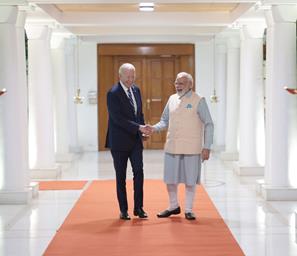India and US Forge Ahead: A Defining Moment in Bilateral Relations
India and the US have announced a series of collaborative initiatives, highlighting their close partnership and strengthening ties.
In a significant diplomatic stride, Indian Prime Minister Narendra Modi welcomed U.S. President Joseph R. Biden, Jr., marking a pivotal moment in the relationship between the two behemoths of global democracy.
Joseph R. Biden, Jr., marking a pivotal moment in the relationship between the two behemoths of global democracy.
In a landmark move showcasing the strengthening of ties between India and the United States, both nations announced a series of collaborative initiatives on Thursday, underscoring their close partnership.
Central to the discussions were the shared values that have historically united India and the U.S. Leaders of both nations reaffirmed their commitment to freedom, democracy, human rights, inclusion, pluralism, and equality. These core principles anchor their domestic policies and have become the bedrock of their international collaborations.
The global spotlight was also on India’s expanding influence, with President Biden lauding its leadership role in the G20. The emphasis on the Quad Alliance signals a united front for an accessible and inclusive Indo-Pacific region, further amplified by India’s proactive involvement in the Indo-Pacific Oceans Initiative Pillar on Trade Connectivity and Maritime Transport.
Notably, discussions on the longstanding issue of UN Security Council reforms garnered attention. President Biden’s endorsement of India for a permanent UNSC seat and his backing for India’s 2028–29 non-permanent seat bid underscored the shifting global power dynamics and India’s ascent on the world stage.
The meeting also spotlighted the burgeoning tech alliance between the nations. Both leaders acknowledged technology’s pivotal role in modern diplomacy, with the forthcoming midterm review of the India-U.S. iCET in 2023 setting the stage for deeper cooperation. Space, another frontier of collaboration, saw President Biden laud ISRO’s successes, hinting at joint ventures targeting the International Space Station and asteroid defense.
The U.S.’s faith in India’s tech potential was further solidified with significant investments by tech giants like Microchip Technology, Inc., and Advanced Micro Devices. A testament to their shared digital vision was the MoU inked between the Bharat 6G Alliance and the Next G Alliance, promising a fortified digital future.
Quantum technologies and biomanufacturing emerged as the next-gen collaboration domains. The association between renowned institutions such as the S.N. Bose National Centre for Basic Sciences, Kolkata, and the Quantum Economic Development Consortium indicates this thrust. The partnership between the U.S. National Science Foundation and India’s Department of Biotechnology further consolidates the commitment to scientific innovation.
In summation, this meeting wasn’t mere diplomatic formalities. It heralded an era where shared values and combined ambitions shaped global politics. As both nations envision a cooperative future across diverse domains, the global community observes with bated breath, optimistic about the possibilities.
The two countries’ leaders recommitted to building resilient technology value chains and enhancing defense industrial ecosystems. Both nations are set to further their cooperation in new and emerging domains like space, artificial intelligence, and defense. The start of negotiations between GE Aerospace and Hindustan Aeronautical Limited (HAL) for a business agreement to produce jet engines in India brought this into focus.
Furthermore, the educational landscape will also see a boost with the signing of a Memorandum of Understanding (MoU) between the Council of Indian Institutes of Technology (IIT Council) and the Association of American Universities (AAU) to establish the India-U.S. Global Challenges Institute. The Institute aims to advance new frontiers in various fields like sustainable energy, agriculture, health, artificial intelligence, and quantum science.
The growing number of collaborative educational partnerships between prominent institutions like New York University-Tandon and IIT Kanpur Advanced Research Center further highlighted the emphasis on educational exchange.
Gender equality in the digital economy was also addressed, with both leaders supporting the Women in the Digital Economy Initiative, aimed at halving the digital gender gap by 2030.
In the defense sector, the India-U.S. Defence Acceleration Ecosystem (INDUS-X) sets the tone for innovative collaboration, working towards addressing shared security challenges. President Biden also welcomed India’s procurement of General Atomics MQ-9B remotely piloted aircraft, a move that will significantly enhance the capabilities of India’s armed forces.
A significant emphasis was also placed on green initiatives. The leaders highlighted their commitment to decarbonising the transport sector, emphasising the expansion of electric mobility in India. The creation of investment platforms to lower capital costs and hasten the deployment of greenfield renewable energy was also discussed. Both nations pledged US$1 billion to anchor a renewable infrastructure investment fund.
Trade relations received a boost with the settlement of the seventh and last outstanding World Trade Organisation (WTO) dispute between the two countries, further solidifying the strong trade relationship they share.
India and the U.S. Amplify Bilateral Health Cooperation: In the joint statement released on 8 September 2023, the leaders of India and the U.S. expressed enthusiasm for the expanding bilateral collaboration in cancer research, prevention, control, and management. They eagerly await the launch of the India-U.S. Cancer Dialogue in November 2023, which aims to propel advancements in cancer genomics and foster the development of cutting-edge diagnostics and therapeutics. This initiative also seeks to bolster cancer care, especially for underserved urban and rural demographics. Additionally, the upcoming U.S.-India Health Dialogue, scheduled for October 2023 in Washington, D.C., further accentuates the two nations’ unified pledge to fortify scientific, regulatory, and health ties.
In a touching tribute to fallen heroes, an arrangement has been renewed between the U.S. Department of Defense and the Anthropological Survey of India to recover the remains of U.S. service members from World War II.
In their closing remarks, Prime Minister Modi and President Biden affirmed their dedication to maintaining high levels of engagement, aiming for a future that benefits both nations and contributes to a resilient Indo-Pacific region.
